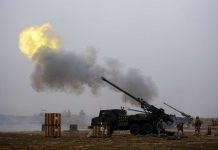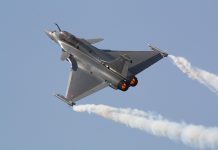
In the midst of escalating controversies surrounding the significant transfer of U.S. armaments to Ukraine for its operations against Russia, concerns have arisen regarding the potential compromise of America’s defense capabilities. This situation is further exacerbated by the imperative to supply arms to Israel for its conflict against the Hamas militant group. Adding his voice to the growing chorus of caution is retired U.S. Army Brigadier General Don Bolduc.
As a prominent figure in the U.S. military, General Bolduc’s service spanned from 1981 to 2017, marked by two Purple Hearts and leadership of Africa’s Army Special Operations Command. Nevertheless, his tenure was not devoid of controversy, notably stemming from his political statements. Nevertheless, his insights on the matter of aid to Ukraine have gained traction, particularly within the political right in the United States.
General Bolduc expressed his concern over the perceived weakening of the U.S. military under the Biden administration, characterizing it as “extremely weak,” overstretched, and logistically challenged. He voiced worries that these conditions pose “a very serious problem for America and its national security apparatus.”
“I think it’s a wake-up call to the American people that you know during the Biden administration our military has become extremely weak. We’ve become overstretched. Logistically, we could not support really a lot of things that would go on simultaneously in this world,” said General Bolduc.
The decisions regarding the continuation of support for Ukraine revolve around the fundamental premise that the weaponry deployed in Eastern Europe differs substantially from what would be required in a potential conflict with China in the Pacific region. However, the possibility of a large-scale conflict erupting in the Middle East, in addition to the ongoing threat posed by well-armed North Korean forces, underscores the ongoing need for military assets such as artillery pieces, 155mm munitions, and armored vehicles. Even in the context of East Asia, scenarios involving a conflict with China would necessitate significant ground operations by the U.S. Military.
The Ukrainian armed forces’ limited progress during their extended summer offensives, which resulted in substantial casualties, has contributed to the growing calls for a reevaluation of future aid commitments. Notably, American Bradley fighting vehicles have suffered significant losses in combat.
In a late September vote, 93 Republicans supported an amendment to a defense funding bill that sought to prohibit further military assistance to Ukraine. Furthermore, on September 30th, the Republican-controlled Congress blocked additional aid. The removal of House Speaker Kevin McCarthy, who played a pivotal role in facilitating previous aid packages, has further complicated Kyiv’s situation. Without the Speaker’s support, the House remains deadlocked in terms of passing crucial legislation.
The anticipated reduction or cessation of Western arms donations and funding could potentially influence the course of the conflict. Given the strategic importance of the conflict to Russia, it may be willing to endure long-term sacrifices to sustain its war efforts.




